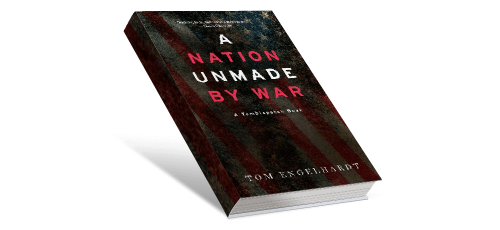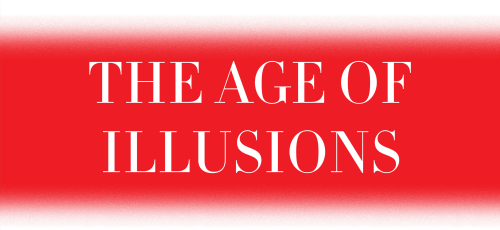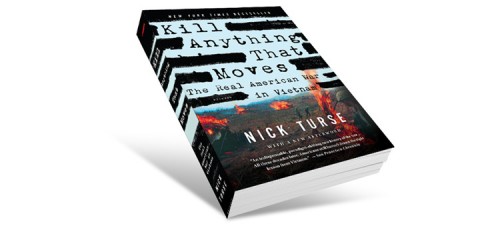
See Page Five
Tom Engelhardt
So you won’t be surprised to learn that its front page was essentially all Iran and The Donald. Atop it, there was a large photo of the president heading for a podium with his generals and officials lined up on either side of him. Its caption read: “‘The United States is ready to embrace peace with all who seek it,’ President Trump said Wednesday at the White House.” Beside it, the lead story was headlined “U.S. and Iranians Lower Tensions, at Least for Now.” Below were three more Iran-related pieces, taking up much of the rest of the page. (“A President’s Mixed Messages Unsettle More Than Reassure,” etc.)
At the bottom left, there was a fifth Iran-related article. Inside that 24-page section of the paper, there were seven more full pages of coverage on the subject. Only one other piece of hot news could be squeezed (with photo) onto the bottom right of the front page. And whether you still read actual papers or now live only in the world of the Internet, I doubt you’ll be shocked to learn that it focused on Meghan Markle and Prince Harry, already involved in a crisis among the British Royals that was almost Iranian in its intensity. The headline: “In Stunning Step, Duke and Duchess Seek New Title: Part-Timers.”

The “Revolution of ’89” Reassessed
Andrew Bacevich
Thirty years ago this month, President George H.W. Bush appeared before a joint session of Congress to deliver his first State of the Union Address, the first post-Cold War observance of this annual ritual. Just weeks before, the Berlin Wall had fallen. That event, the president declared, “marks the beginning of a new era in the world’s affairs.” The Cold War, that “long twilight struggle” (as President John F. Kennedy so famously described it), had just come to an abrupt end. A new day was dawning. President Bush seized the opportunity to explain just what that dawning signified.
“There are singular moments in history, dates that divide all that goes before from all that comes after,” the president said. The end of World War II had been just such a moment. In the decades that followed, 1945 provided “the common frame of reference, the compass points of the postwar era we’ve relied upon to understand ourselves.” Yet the hopeful developments of the year just concluded — Bush referred to them collectively as “the Revolution of ’89” — had initiated “a new era in the world’s affairs.”
While many things were certain to change, the president felt sure that one element of continuity would persist: the United States would determine history’s onward course. “America, not just the nation but an idea,” he emphasized, is and was sure to remain “alive in the minds of people everywhere.”

No, That’s Not a Typo
Tom Engelhardt
Yes, our infrastructure stinks, our schools are failing, this country’s a nightmare of inequality, and there’s a self-promoting madman in the White House, so isn’t it time to take pride in the rare institutional victories America has had in this century? Arguably, none has been more striking than the triumphal success of the American war system.
Oh, you’re going to bring that up immediately? Okay, you’re right. It’s true enough that the U.S. military can’t win a war anymore. In this century, it’s never come out on top anywhere, not once, not definitively. And yes, just to get a step ahead of you, everywhere it’s set foot across the Greater Middle East and Africa, it seems to have killed startling numbers of people and uprooted so many more, sending lots of them into exile and so unsettling other parts of the world as well. In the process, it’s also had remarkable success spreading failed states and terror groups far and wide.
Al-Qaeda, whose 19 suicidal hijackers so devastatingly struck this country on September 11, 2001, was just a modest outfit then (even if its leader dreamt of drawing the U.S. into conflicts across the Islamic world that would promote his group big time). Nineteen years later, its branches have spread from Yemen to West Africa, while the original al-Qaeda still exists. And don’t forget its horrific progeny, the Islamic State, or ISIS (originally al-Qaeda in Iraq). Though the U.S. military has declared it defeated in its “caliphate” (it isn’t, not truly), its branches have multiplied from the Philippines deep into Africa.

How America Squandered Its Cold War Victory
Andrew Bacevich

U.S. “Plans” for the Afghan War Might Prove a Crime Against Humanity
Nick Turse
On February 4, 2002, a Predator drone circled over Afghanistan’s Paktia province, near the city of Khost. Below was al-Qaeda’s founder Osama bin Laden — or at least someone in the CIA thought so — and he was marked for death. As Secretary of Defense Donald Rumsfeld put it later, both awkwardly and passively: “A decision was made to fire the Hellfire missile. It was fired.” That air-to-ground, laser-guided missile — designed to obliterate tanks, bunkers, helicopters, and people — did exactly what it was meant to do.
As it happened, though (and not for the first time in its history either), the CIA got it wrong. It wasn’t Osama bin Laden on the receiving end of that strike, or a member of al-Qaeda, or even of the Taliban. The dead, local witnesses reported, were civilians out collecting scrap metal, ordinary people going about their daily work just as thousands of Americans had been doing at the World Trade Center only months earlier when terror struck from the skies.
In the years since, those Afghan scrap collectors have been joined by more than 157,000 war dead in that embattled land. That’s a heavy toll, but represents just a fraction of the body count from America’s post-9/11 wars. According to a study by the Costs of War Project of Brown University’s Watson Institute, as many as 801,000 people, combatants and noncombatants alike, have been killed in those conflicts. That’s a staggering number, the equivalent of the Rwandan genocide of 1994. But if President Donald Trump is to be believed, the United States has “plans” that could bury that grim count in staggering numbers of dead. The “method of war” he suggested employing could produce more than 20 times that number in a single country — an estimated 20 million or more Afghans, almost all of them civilians.
